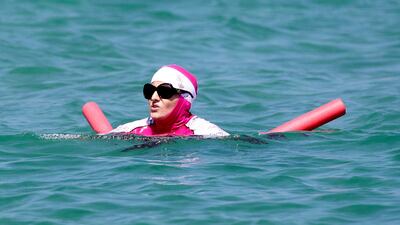French city Grenoble has lifted a ban on the “burkini” swimsuit, in a move set to reignite debate over France's secular traditions.
The south-eastern Alpine city's council, which is dominated by The Greens, scrapped its bathing dress code in a vote on Monday.
This means women can now wear the swimsuit — which covers the whole body except the face, the hands and the feet ― in the city's state-run swimming pools.
The burkini, used by some Muslim women to cover their bodies and hair while bathing, has in the past been a lightning rod in often-hostile debate over public displays of Islam in France.
Seen by opponents as a symbol of creeping Islamism and an affront to France's secular traditions, many right-wingers and some feminists would like to ban it.
It is prohibited in most state-run pools — for hygienic, not religious reasons. Strict swimwear hygiene rules apply to all, including men who are required to wear tight-fitting trunks.
The Grenoble move would effectively authorise long body coverings and beach shorts for men, as well as topless bathing for women, in city pools.
“All we want is for women and men to be able to dress how they want,” mayor Eric Piolle told broadcaster RMC Monday.
Opponents see it differently. Conservative head of the wider Auvergne-Rhone-Alpes region, Laurent Wauquiez, has threatened to withdraw funding from the city.
“I am convinced that what Mr Piolle is defending is a dreadful dead-end for our country,” Mr Wauquiez said at the beginning of May.
He accused Mr Piolle of “doing deals with political Islam” to “buy votes”.
The regional spat has put the burkini back in the headlines nationally, animating French talk shows and the political class before parliamentary elections next month.
The issue of how people dress for the pool touches on highly sensitive topics in France — including fears about the influence of Islam and threats to the country's secularism.
“It seems to me that [Mr Piolle] doesn't realise the harm he is doing to our republican values,” Prisca Thevenot, a spokeswoman for President Emmanuel Macron's La Republique En Marche party told Radio J on Monday.
“This would be breaking with the rules to respond to political desires based on religion.”
Opposition councillors in Grenoble wrote in an open letter last week that “the burkini aims, purely and simply, to impose Islamist values at the heart of bathing areas and public leisure pursuits”.
Attempts by local mayors in the South of France to ban the burkini on beaches in 2016 led to heated debate over the issue.
Those rules, introduced after a string of terror attacks in France, were eventually struck down as discriminatory.
Three years later, a group of women in Grenoble caused a splash by forcing their way into a pool wearing burkinis, leading the prime minister at the time to insist that the rules should be followed in public pools.
One of those who pushed their way into the pool was Taous, a Muslim who lives in Grenoble and wears a hijab.
She told France24 before the vote that those protests were the first time she had been able to put her feet in a swimming pool in France.
When her children go to the pool, Taous said she could just watch them, unable to join them because of the ban.
She said the rules should change not just to allow burkinis, but to allow more choice for all women.
“The rules are not specifically about burkinis,” she said. “They are also planning to allow women to show their breasts, if they want to.
“It’s really a question of feminism and letting women wear what they want to. I believe in each woman's right to choose.”
French sports brand Decathlon found itself at the centre of controversy in 2019, when it announced plans to sell a “sports hijab”, enabling Muslim women to cover their hair while running.
Monday's vote in Grenoble “is an important moment for everyone concerned and their allies, but also in the fight against Islamophobia and control over women's bodies”, local campaign group Citizens' Alliance wrote on its Facebook page.
Demonstrations supporting and opposing the move were planned in the city following the council meeting.
Grenoble is not the first city to change its rules.
The north-western city of Rennes quietly updated its pool code in 2019 to allow burkinis and other types of swimwear.
Debate about the burkini comes as French Muslim women footballers are battling to overturn a ban on the wearing of religious symbols during competitive matches.
The French Football Federation prevents players from playing while wearing “ostentatious” religious symbols, such as the Muslim hijab or the Jewish kippa.
A women's collective known as “les Hijabeuses” launched a legal challenge last November.


